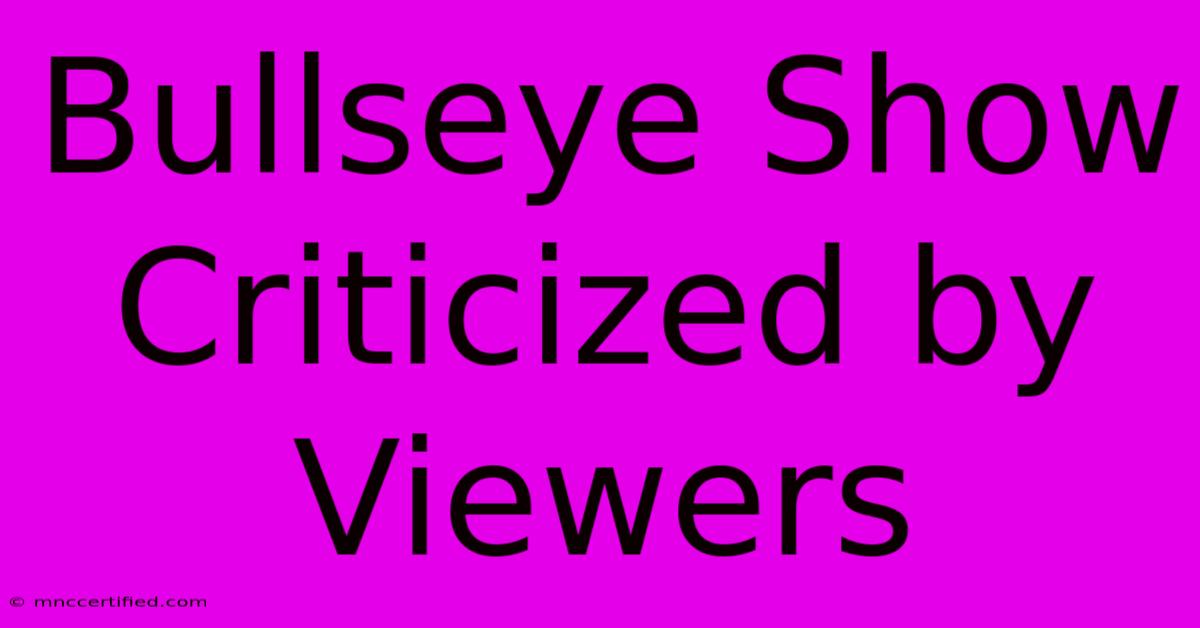Bullseye Show Criticized By Viewers

Table of Contents
Bullseye Show Criticized by Viewers: A Deep Dive into the Controversy
The popular game show, Bullseye, has recently found itself at the center of a brewing controversy, with viewers taking to social media and online forums to voice their criticisms. While the show has long been a staple of television entertainment, a wave of negative feedback highlights some significant concerns about its format, content, and overall impact. This article delves into the specifics of these criticisms, exploring the reasons behind the viewer backlash and analyzing its potential consequences for the show's future.
Main Criticisms Targeting Bullseye
The criticisms leveled against Bullseye are multifaceted, ranging from concerns about fairness and game mechanics to broader issues of representation and tone. Let's break down the key areas of contention:
1. Perceived Unfairness and Game Mechanics:
Many viewers have voiced concerns about the perceived unfairness of certain game segments. Specific complaints include:
- Biased questions: Accusations of questions favoring certain contestants or being overly difficult for others have surfaced repeatedly. The lack of transparency in question selection fuels this criticism.
- Uneven playing field: Some argue that the physical challenges are not equally demanding for all contestants, creating an inherent imbalance.
- Arbitrary scoring: Inconsistencies in scoring, particularly in subjective judging segments, have led to accusations of favoritism and a lack of objective standards.
2. Lack of Diversity and Representation:
Another major source of criticism stems from the perceived lack of diversity among contestants and the show's overall representation. Viewers have highlighted:
- Underrepresentation of minority groups: The noticeable absence of contestants from diverse ethnic and socioeconomic backgrounds has prompted accusations of a lack of inclusivity.
- Gender imbalance: A disproportionate number of male contestants compared to female contestants has further fueled the criticism surrounding representation.
3. Tone and Content Concerns:
Beyond game mechanics and representation, some viewers have raised concerns about the show's overall tone and content:
- Excessive competitiveness: The highly competitive nature of the show, some argue, promotes an environment of aggression and animosity amongst contestants.
- Lack of positive reinforcement: The absence of sufficient positive reinforcement for contestants, regardless of win or loss, has been seen as contributing to a negative viewing experience.
- Outdated format: Some argue the show's format is outdated and fails to connect with modern audiences who expect more innovative and engaging game show experiences.
The Impact of the Backlash and Potential Solutions
The wave of negative feedback presents a significant challenge for Bullseye. Ignoring these concerns could lead to declining viewership and damage the show's long-term reputation. To address the situation, the producers should consider implementing the following:
- Reviewing game mechanics: A thorough review of game mechanics is crucial to ensure fairness and address concerns about biased questions and uneven playing fields. Independent auditing of question selection and scoring systems could be beneficial.
- Improving diversity and inclusion: Proactive efforts are needed to increase the diversity of contestants and ensure fair representation of different demographics. This includes actively seeking out and recruiting participants from underrepresented groups.
- Adjusting show format and tone: Modernizing the show's format and adjusting its tone to be more inclusive and less aggressive could attract a wider audience and improve the overall viewing experience.
Conclusion: Listening to the Viewers is Key
The criticisms against Bullseye highlight the importance of listening to viewer feedback and actively working to address concerns. While the show has enjoyed a long run, adapting to changing expectations and addressing issues of fairness, representation, and tone is crucial for its survival and continued success in the competitive television landscape. Ignoring the backlash risks alienating viewers and potentially leading to the show's decline. The future of Bullseye depends on its willingness to engage with these criticisms constructively and implement meaningful changes.

Thank you for visiting our website wich cover about Bullseye Show Criticized By Viewers. We hope the information provided has been useful to you. Feel free to contact us if you have any questions or need further assistance. See you next time and dont miss to bookmark.
Featured Posts
-
Trump Threatens Panama Canal Takeover
Dec 23, 2024
-
49ers Out Commanders Win
Dec 23, 2024
-
5 Must Know Facts Titans Vs Colts Game
Dec 23, 2024
-
Nfl Week 16 Jets Fall 19 9 To Rams
Dec 23, 2024
-
2024 Week 16 Vikings Seahawks Inactive List
Dec 23, 2024